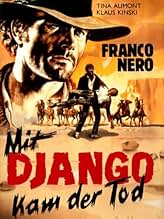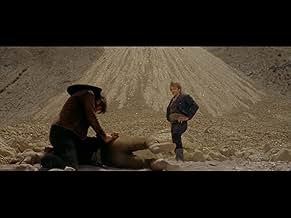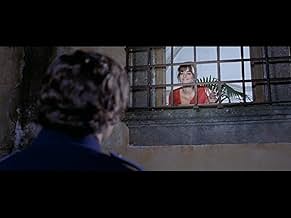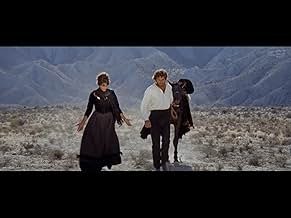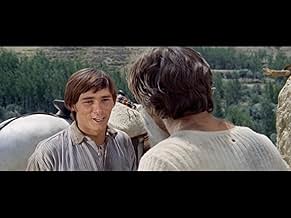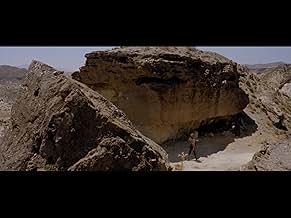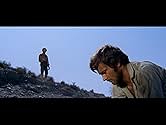L'Homme, l'Orgueil et la Vengeance
Titre original : L'uomo, l'orgoglio, la vendetta
- 1967
- Tous publics
- 1h 41min
NOTE IMDb
5,9/10
817
MA NOTE
Ajouter une intrigue dans votre langueA stalwart Spanish soldier turns to a life of crime to prove his love for a mysterious and promiscuous gypsy woman.A stalwart Spanish soldier turns to a life of crime to prove his love for a mysterious and promiscuous gypsy woman.A stalwart Spanish soldier turns to a life of crime to prove his love for a mysterious and promiscuous gypsy woman.
- Réalisation
- Scénario
- Casting principal
Klaus Kinski
- Garcia
- (as Klaus Kinsky)
Guido Lollobrigida
- Dancairo
- (as Lee Burton)
Nina De Padova
- Factory Worker
- (as Anna De Padova)
Giovanni Ivan Scratuglia
- Soldier Arresting Carmen
- (as Ivan Giovanni Scratuglia)
Hans Albrecht
- Miguel, Garcia's Companion
- (non crédité)
Luisa De Padova
- Street Girl
- (non crédité)
Rex Gildo
- Soldier Arresting Carmen
- (non crédité)
Alba Maiolini
- Factory's Supervisor
- (non crédité)
Avis à la une
Why are all the beautiful gypsies women so difficult? To make your life so miserable that you want to kill them? I had a similar experience with one, but I didn't kill her, in the end I found another woman. The film is well done, Franco Nero and Tina Aumont, in particular, they are very good, very believable and natural. What didn't convince me are two scenes: when they make love fully clothed and when Klaus Kinski shot the boy, although in the previous scene he had no bullets left in his revolver, because he had shot them all (far too many than a revolver can have - usually only 6) in the man he had been following on horseback. To appreciate the ease with which Klaus Kinski always knew how to make himself unbearable, to want to kill him too.
Intriguing hybrid adventure, as much a ripping yarn as a western.
Unredeemed human suffering, violence, lust and betrayal – this could be a spaghetti western inspired by Dostoevsky.
In a recent interview, Franco Nero contrasted the Hollywood western hero with the Italian spaghetti western hero:– the former is indeed a hero, while the latter is more a 'son-of-a-bitch'. Yet Nero plays no such 'son-of-a-bitch' role in this film. Trauma and tragedy are his lot. Nero's attitude to the marketing fixation with the 'Django' name was simply – 'It's their problem'. He maintains that he only ever made one 'Django' film, and it certainly was not this one, so don't be taken in by the German title of 'Mit Django kam der Tod' ('With Django Came Death').
It is hard to believe that such awesome landscapes exist within our very own EU (shot in Andalucia!). I particularly enjoyed the careful rationing of images of water, which contrasted so starkly with the bone-dry natural setting. The change of location from Spain to Mexico in the uncut German version gets away with murder. For example, one scene showing the longing for an escape from an outlaw's exile in the desert is expressed in some shot-reverse-shot images of a tortured gaze at flamingos taking off from a lake. The birds are fortunately native to both Spain and Mexico...
Gypsies too are native to both – though our Carmen (i.e. Django's 'Conchita' in the uncut German) would be a rather Spanish-looking gypsy for Mexico, were it not for the black mourning clothes she wears in remembrance of her mother. The Italian-to-German dubbing has been done to a high standard – no mean feat considering that the names of characters and locations have also been altered in the German. Soldiers of the Spanish Bourbon regime must have had uniforms that almost pass for those of the US Civil War – or can some military history hack out there expose the shameless German tampering ...?
Unredeemed human suffering, violence, lust and betrayal – this could be a spaghetti western inspired by Dostoevsky.
In a recent interview, Franco Nero contrasted the Hollywood western hero with the Italian spaghetti western hero:– the former is indeed a hero, while the latter is more a 'son-of-a-bitch'. Yet Nero plays no such 'son-of-a-bitch' role in this film. Trauma and tragedy are his lot. Nero's attitude to the marketing fixation with the 'Django' name was simply – 'It's their problem'. He maintains that he only ever made one 'Django' film, and it certainly was not this one, so don't be taken in by the German title of 'Mit Django kam der Tod' ('With Django Came Death').
It is hard to believe that such awesome landscapes exist within our very own EU (shot in Andalucia!). I particularly enjoyed the careful rationing of images of water, which contrasted so starkly with the bone-dry natural setting. The change of location from Spain to Mexico in the uncut German version gets away with murder. For example, one scene showing the longing for an escape from an outlaw's exile in the desert is expressed in some shot-reverse-shot images of a tortured gaze at flamingos taking off from a lake. The birds are fortunately native to both Spain and Mexico...
Gypsies too are native to both – though our Carmen (i.e. Django's 'Conchita' in the uncut German) would be a rather Spanish-looking gypsy for Mexico, were it not for the black mourning clothes she wears in remembrance of her mother. The Italian-to-German dubbing has been done to a high standard – no mean feat considering that the names of characters and locations have also been altered in the German. Soldiers of the Spanish Bourbon regime must have had uniforms that almost pass for those of the US Civil War – or can some military history hack out there expose the shameless German tampering ...?
10liderc
This is an adaption of the classic novel Carmen which puts the main characters into a Spaghetti Western setting, but instead of yet another Spaghetti Western director Luigi Bazzoni created a brooding drama full of psychological tension and visually spectacular sequences. If you are looking for an action movie, look somewhere else, although the movie does contain a very well photographed chase sequence.
Franco Nero again proves to be a great actor and Tina Aumont does a splendid job, too. Klaus Kinski is typecast as the crazy villain again and he again plays this part very well. Look out for the guest appearance of the Austrian Burgschauspieler Karl Schönböck!
Carlo Rustichelli's score matches the movie perfectly since it's a lavish mix of operatic music and brooding low-key pieces. (Get the soundtrack CD released by CAM!)
Only a heavily cut version made it to the German cinemas and again it was tried to sell a movie as yet another adventure of Django, which is even more nonsensical if the literary source of this movie is considered.
Two thumbs up and many thanks to Black Hill/McOne who released the uncut version on DVD in Germany!
Franco Nero again proves to be a great actor and Tina Aumont does a splendid job, too. Klaus Kinski is typecast as the crazy villain again and he again plays this part very well. Look out for the guest appearance of the Austrian Burgschauspieler Karl Schönböck!
Carlo Rustichelli's score matches the movie perfectly since it's a lavish mix of operatic music and brooding low-key pieces. (Get the soundtrack CD released by CAM!)
Only a heavily cut version made it to the German cinemas and again it was tried to sell a movie as yet another adventure of Django, which is even more nonsensical if the literary source of this movie is considered.
Two thumbs up and many thanks to Black Hill/McOne who released the uncut version on DVD in Germany!
Scores of films have been inspired by Georges Bizet's opera Carmen, but here is one with a difference. The director Luigi Bazzoni (working with Italy's most illustrious script-writer, Suso Cecchi d'Amico) chose to ditch the opera, go back to Prosper Merimee's original novella - and shoot it in the style of a Spaghetti Western!
Bazzoni's camerawork is more frenetic than inventive, and his film never quite works. Still, it does boast a wondrous cast. Franco Nero, blue eyes blazing in his dark-bronzed face, is the naive young soldier Jose. Klaus Kinski, teeth gnashing and lips curling in his usual manner, is the sadistic bandit Garcia. And lovely Tina Aumont enjoys a rare leading role as Carmen - the amoral and seductive gypsy who drags both men to their doom.
Aumont may not be the world's greatest actress. (In fact, she can barely act at all!) But like her mother, Maria 'Cobra Woman' Montez, she seems to have the words FEMME FATALE emblazoned in bright scarlet letters across her forehead. Her enormous dark eyes are wells of untold depravity. Her pouting, voluptuous mouth would lure any man to his ruin. If you remember anything in this film, it will be her.
Bazzoni's camerawork is more frenetic than inventive, and his film never quite works. Still, it does boast a wondrous cast. Franco Nero, blue eyes blazing in his dark-bronzed face, is the naive young soldier Jose. Klaus Kinski, teeth gnashing and lips curling in his usual manner, is the sadistic bandit Garcia. And lovely Tina Aumont enjoys a rare leading role as Carmen - the amoral and seductive gypsy who drags both men to their doom.
Aumont may not be the world's greatest actress. (In fact, she can barely act at all!) But like her mother, Maria 'Cobra Woman' Montez, she seems to have the words FEMME FATALE emblazoned in bright scarlet letters across her forehead. Her enormous dark eyes are wells of untold depravity. Her pouting, voluptuous mouth would lure any man to his ruin. If you remember anything in this film, it will be her.
Le saviez-vous
- AnecdotesMan, Pride and Vengeance (Italian: L'Homme, l'Orgueil et la Vengeance (1967), German: Mit Django kam der Tod) is a 1967 Spaghetti Western film written and directed by Luigi Bazzoni and starring Franco Nero, Tina Aumont, and Klaus Kinski. It is a Western film adaptation of the novella Carmen by Prosper Mérimée, and is one of the few Westerns not only filmed, but also set in Europe.
- Versions alternativesThe German version was cut to 91 minutes and calls the main characters Django and Conchita.
- ConnexionsReferenced in Kathenas me tin trella tou... (1980)
Meilleurs choix
Connectez-vous pour évaluer et suivre la liste de favoris afin de recevoir des recommandations personnalisées
- How long is Man, Pride & Vengeance?Alimenté par Alexa
Détails
- Durée
- 1h 41min(101 min)
- Mixage
- Rapport de forme
- 2.35 : 1
Contribuer à cette page
Suggérer une modification ou ajouter du contenu manquant

